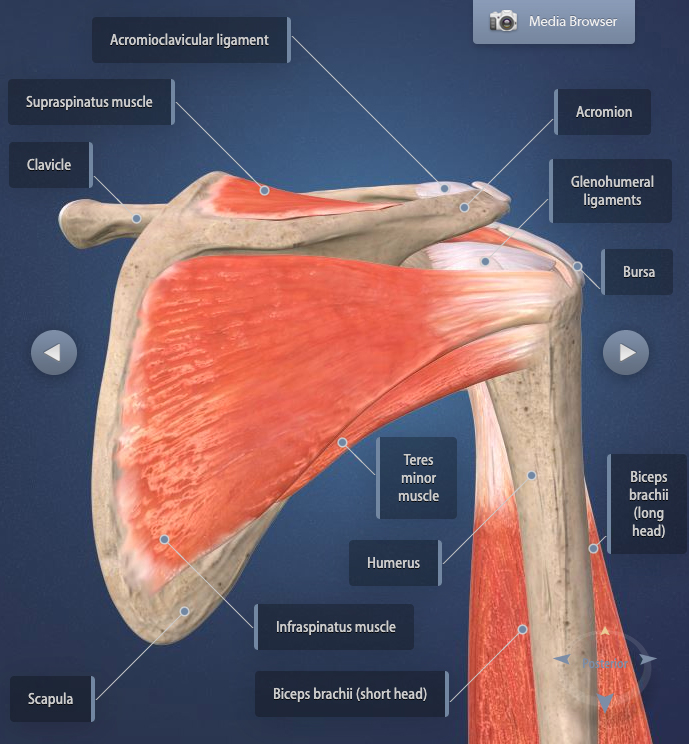What is Frozen Shoulder? Causes & Treatment
Aptly named, a frozen shoulder feels as if your shoulder is nearly frozen in place, unable to move or perform as it should. Also called adhesive capsulitis, frozen shoulder is a painful condition that causes inflammation and stiffness that increases over time. If you believe you have this condition, it’s important to see an orthopedic shoulder specialist for proper diagnosis, as common frozen shoulder symptoms can also be caused by a different disease or injury.
Frozen Shoulder Anatomy
The shoulder is a ball-and-socket joint that contains synovial fluid, which is a gel-like substance that provides lubrication and cushions the shoulder joint. Three bones make up the shoulder joint: the humerus (upper arm), the scapula (shoulder blade) and the clavicle (collarbone).
The humerus fits into the scapula and strong connective tissue called the shoulder joint capsule that surrounds the joint and rotator cuff tendons. Additionally, the shoulder joint capsule contains the ligaments that connect the humerus head to the glenoid (shoulder socket), which helps stabilize the joint.
Frozen shoulder occurs when this collective tissue becomes inflamed, thickens and becomes tight. As this happens, adhesions – or thick bands of tissue – form and there is less synovial fluid in the shoulder joint to pad the bones and reduce friction.
Stages of Frozen Shoulder
Freezing Stage
In this first stage, the shoulder begins to become painful and difficult to move. As the pain increases over time, the less the shoulder is used. This lack of use may alleviate some pain; however, the less the shoulder is used, the thicker the shoulder joint’s collective tissue becomes. The freezing stage usually lasts for 6 weeks to 9 months.
Frozen Stage
In the second stage, the stiffness typically remains but the pain may noticeably lessen. While it may “feel” better, this condition makes daily tasks and activities difficult or impossible. This stage can last 2 to 6 months.
Thawing Stage
In the final stage, mobility slowly improves and the pain lessens. It takes anywhere from 6 months to 2 years to return to normal strength and mobility.
Frozen Shoulder Symptoms, Causes & Risk Factors
The two main symptoms are pain and stiffness. The pain is typically a dull, achy pain that is worse at night, when you move your arm and during the freezing stage of the disease. The pain usually affects the outer shoulder and the upper arm. Depending on what stage you’re in (freezing, frozen or thawing), your symptoms will vary.
Orthopedic shoulder specialists do not yet fully understand the causes behind this condition. Moreover, there is no evidence linking arm dominance or occupation to its development.
However, certain risk factors have been attributed to frozen shoulder.
Age & Sex
Individuals over the age of 40, particularly women, experience shoulder stiffness at significantly higher rates. This trend underscores the importance of proactive management and early intervention. As we age, the likelihood of developing shoulder stiffness increases, making it crucial to address symptoms promptly. By staying informed and seeking timely care, individuals can mitigate the impact and maintain optimal shoulder health.
Injury & Reduced Mobility
Extended periods of immobility—often resulting from rotator cuff injuries, fractures, or surgical recovery—pose a significant risk of developing shoulder stiffness. When the shoulder remains inactive for an extended time, the surrounding tissues can become tight and less flexible. Consequently, this stiffness can severely hinder shoulder mobility and impede the healing process. Therefore, it is crucial to actively manage and rehabilitate the shoulder during recovery to maintain flexibility and function.
Diabetes
According to the Cleveland Clinic, between 10 and 20 percent of individuals with diabetes will experience frozen shoulder during their lifetime. This statistic highlights a significant correlation between diabetes and the risk of developing this condition. Consequently, it’s crucial for those with diabetes to be aware of this potential complication and seek timely intervention if symptoms arise. Understanding this link can help in proactive management and early treatment, ultimately improving patient outcomes.
Other Diseases & Health Conditions
Frozen shoulder can be a result of several significant health conditions, including strokes, hypothyroidism, hyperthyroidism, heart disease, tuberculosis, Parkinson’s disease, and other forms of stroke. Notably, the immobility resulting from a stroke is a known risk factor for developing this condition. However, it remains unclear why these other diseases also contribute to the onset of frozen shoulder. Despite this uncertainty, it is crucial to recognize these conditions as potential risk factors and to address them proactively in patient care.
Frozen Shoulder Treatments
While frozen shoulder typically gets better over time on its own, it can take up to 3 years if left untreated. Most treatments for frozen shoulder are aimed at pain management and restoration of mobility and strength.
No-Surgical Treatments
Physical Therapy
Physical therapy can help restore motion through stretching and range of motion exercises.
Non-steroidal Anti-inflammatory Drugs (NSAIDs)
Over-the-counter medications like ibuprofen, aspirin and acetaminophen can help reduce pain and swelling.
Steroid injections
Cortisone injections directly into the shoulder joint can reduce inflammation and pain longer than NSAIDs.
Hydrodilatation
If other non-surgical treatments fail to relieve your symptoms, your orthopedic shoulder doctor may recommend this treatment. Hydrodilatation is where a large volume of sterile fluid is injected into the shoulder joint to expand the shoulder joint capsule.
Surgical Treatment
If conservative methods do not work in treating your frozen shoulder, your orthopedic surgeon may recommend surgery. Surgery for a frozen shoulder typically occurs during the frozen stage and includes both manipulation under anesthesia and shoulder arthroscopy. Your shoulder surgeon will likely perform one or both procedures if necessary to release your frozen shoulder.
If you have any questions about frozen shoulders or would like to talk to an orthopedic shoulder specialist, please contact us and we’ll be happy to help.


1 Comment
Permalink
My name is Ali. I’m suffering Diabetic 5years pt.45years